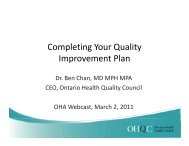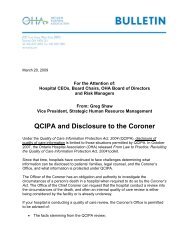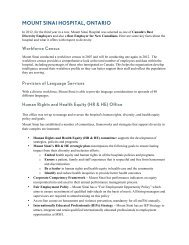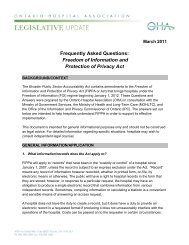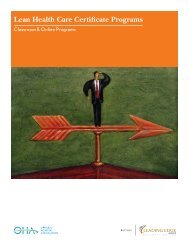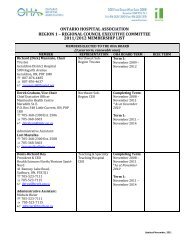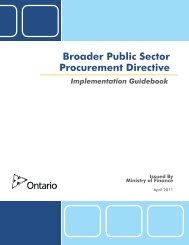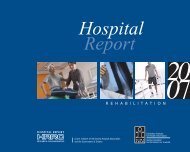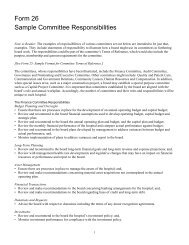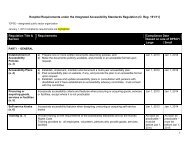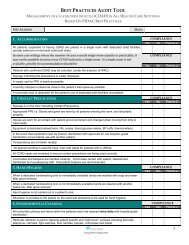Roles and Responsibilities of Physicians Supervising PAs - Ontario ...
Roles and Responsibilities of Physicians Supervising PAs - Ontario ...
Roles and Responsibilities of Physicians Supervising PAs - Ontario ...
- No tags were found...
You also want an ePaper? Increase the reach of your titles
YUMPU automatically turns print PDFs into web optimized ePapers that Google loves.
1. Physician-Patient RelationshipThe overriding principle <strong>of</strong> delegation is that it must usually occur in the context <strong>of</strong> a physicianpatientrelationship. In all instances where a controlled act is delegated, the act remains theresponsibility <strong>of</strong> the physician who authorized it. In most cases, delegation will only occur after thephysician has interviewed the patient, performed an assessment, made recommendations,obtained an informed consent to proceed, <strong>and</strong> instituted a course <strong>of</strong> therapy.In some instances, the patient’s interests will best be served by having the performance <strong>of</strong> thecontrolled act take place prior to assessment by the physician: in a hospital emergency room, forexample, where it is commonplace for some tests to be ordered by a nurse before a physician hasseen the patient. In such circumstances, the delegation may take place pursuant to a physician’sdirect order (where the physician has previously met the patient or engages in a consultation withthe health care pr<strong>of</strong>essional who will perform the delegated act) or a medical directive. 8 When thishappens, it is expected that a physician under whose authority the controlled act has beenperformed will meet <strong>and</strong> assess the patient as soon after it has been performed as possible.The use <strong>of</strong> medical directives to authorize performance <strong>of</strong> a controlled act in advance <strong>of</strong>establishing a physician-patient relationship is intended to capture only those situations where it isin the patient’s best interests to do so. It is not intended to capture situations where, for pecuniaryor convenience reasons, a physician wishes to delegate a controlled act (for example, thedelegation <strong>of</strong> Botox injections in the absence <strong>of</strong> a contemporaneous face to face assessment wouldnot be endorsed by the College).In very limited circumstances delegation may occur in the absence <strong>of</strong> a doctor-patient relationship.One example is the provision <strong>of</strong> care by paramedics under the direct control <strong>of</strong> base hospitalphysicians. 9 Another example is in remote <strong>and</strong> isolated regions <strong>of</strong> the province where primary careis administered by registered nurses acting in exp<strong>and</strong>ed roles. Such programs have establishedprotocols <strong>and</strong> quality assurance mechanisms that provide a proper basis upon which delegationmay occur with good public protection even without a traditional physician-patient relationship.2. Delegate only those acts that form part <strong>of</strong> your regular practice.The RHPA requires the physician to confine medical practice to those areas <strong>of</strong> medicine in whichhe or she is suitably trained <strong>and</strong> experienced. A physician must not delegate the performance <strong>of</strong> anact he or she is not competent to perform personally, <strong>and</strong> which does not form part <strong>of</strong> his or herregular practice <strong>and</strong> daily competency.3. Identify the individual performing the act <strong>and</strong> be aware <strong>of</strong> his or her skills.i) Ensure the individual receiving the delegation has the appropriate knowledge, skill <strong>and</strong>judgement to perform the delegated act.The physician should be satisfied that the individual to whom the act is being delegated has theappropriate knowledge, skill <strong>and</strong> judgement to perform the delegated act. A physician must notdelegate an act where there is a question as to the knowledge, skill <strong>and</strong> judgement <strong>of</strong> the delegate.The College recognizes that in some cases the physician may not personally know the individual towhom he or she is delegating. For example, in a public hospital setting, the hospital employs thedelegates (nurses, respiratory technicians, etc.) <strong>and</strong> the medical staff are not involved in the hiringprocess. In this case, it is the institution's responsibility to ensure that its employees have therequisite knowledge, skill <strong>and</strong> judgement.ii) Check with the relevant regulatory body <strong>of</strong> other health pr<strong>of</strong>essionals where applicable.Updated July 2011 17



